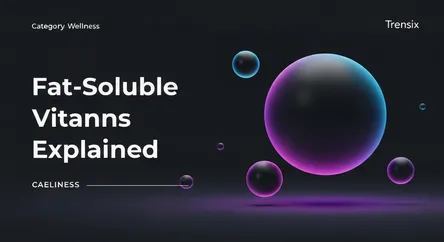Wellness
Fat-Soluble Vitamins Explained

A clear guide to fat-soluble vitamins (A, D, E, and K), how they're stored in the body, and why they are essential for your health.
What is it?
Fat-soluble vitamins are essential micronutrients that dissolve in fats and oils. The four fat-soluble vitamins are A, D, E, and K. Unlike water-soluble vitamins, which are not stored, your body absorbs these vitamins along with dietary fats and stores them in your fatty tissues and liver for later use. Each plays a vital role in bodily functions: Vitamin A is crucial for vision, Vitamin D for bone health, Vitamin E acts as an antioxidant, and Vitamin K is essential for blood clotting.
Why is it trending?
There is growing scientific interest in how fat-soluble vitamins may help prevent and manage chronic diseases. With a greater public focus on personalized nutrition, understanding the unique roles of these vitamins is key for optimizing health. As deficiencies, particularly in Vitamin D, remain a common global concern, the conversation around proper intake and absorption continues to grow. This awareness highlights the importance of dietary fats for nutrient absorption and the potential risks of improper supplementation.
How does it affect people?
Because the body stores fat-soluble vitamins, they can accumulate to toxic levels if consumed in excessive amounts, especially from supplements. A deficiency in any of these vitamins can also lead to serious health issues, such as impaired vision (Vitamin A), weakened bones (Vitamin D), or problems with blood clotting (Vitamin K). For optimal absorption, these vitamins should be eaten with foods containing healthy fats. While a balanced diet provides enough for most people, consulting a healthcare provider is important before starting supplements to avoid toxicity.